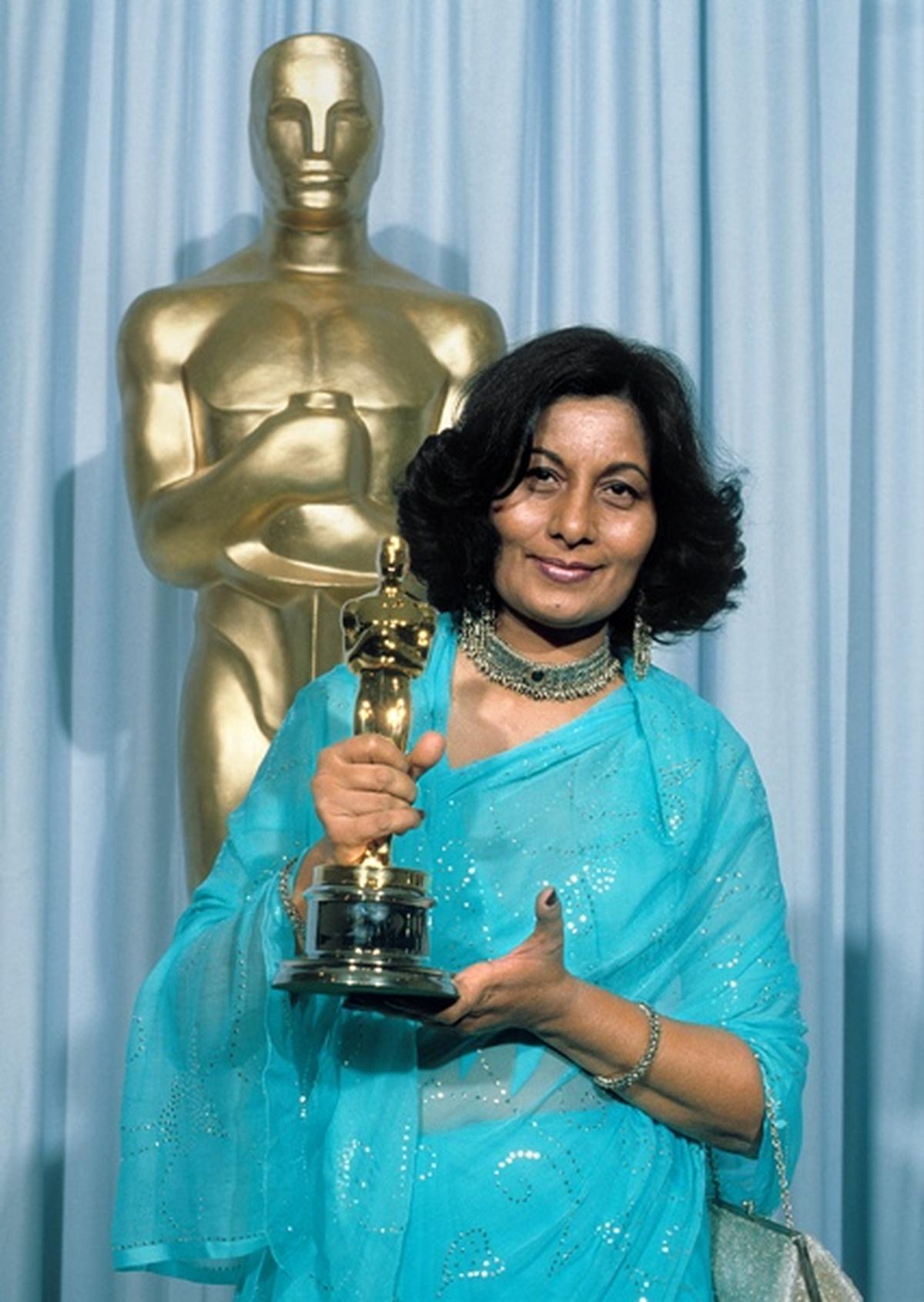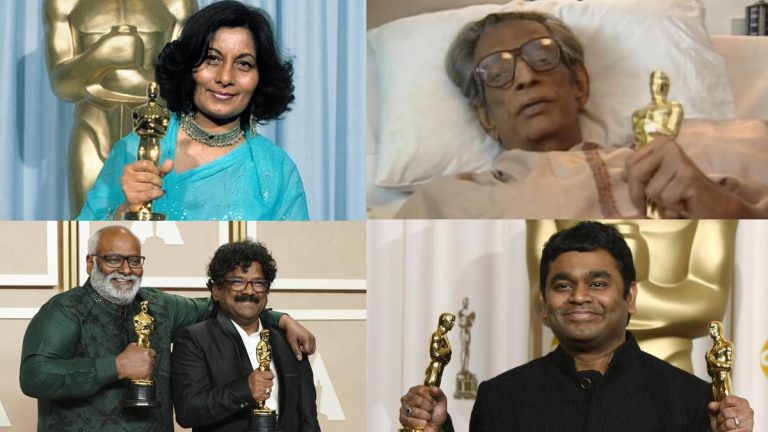
Bhanu Athaiya; Satyajit Ray, AR Rahman, MM Keeravaani and Chandrabose, with their Academy Award trophies
| Photo Credit: Oscars/YouTube, REUTERS/Mike Blake, JORDAN STRAUSS/AP
The 97th Academy Awards, cinema’s glitziest night, are set to take place on Monday (March 3) at the Dolby Theatre in LA, Hollywood. It’s not a particularly robust year for India: Laapataa Ladies, the country’s official submission for Best International Feature, did not make the cut, neither did several independent entries. Instead, some hope rests with Anuja, a poignant 22-minute short film backed by Guneet Monga and Priyanka Chopra Jonas. The film has been nominated in the Best Live Action Short Film category. There is also I Am Ready, Warden, a documentary short, produced and directed by Smriti Mundhra, an American director of Indian origin.
Indians, counting technical awards, have won 10 Oscars in the Academy’s history, which has been pushing for increased diversity in its membership. In recent years, prominent Indian names like Shabana Azmi, Vidya Balan, SS Rajamouli, Rima Das and others have joined the Academy’s 9,905-strong voting strength. As we brace for Oscar night, here is a brief look-back at how, over the last seven decades, Indian representation has broadened at the Oscars.

A.R. Rahman holds up his Oscars for best original song and best original score for “Slumdog Millionaire” backstage at the 81st Academy Awards in Hollywood, California, February 22, 2009.
| Photo Credit:
MIKE BLAKE
‘Mother India’ sails westwards
In 1957, the Academy instituted a separate competitive category for foreign-language films; a year later, Mehboob Khan’s Mother India was submitted as India’s first official submission to the Oscars. Khan, already debt-ridden by the film’s gargantuan production, turned to Jawaharlal Nehru for help. As per legend, he arrived in LA with his wife Sardar Akhtar and attended screenings for Academy voters. There was one catch, though: the famous sickle-and-hammer logo of Mehboob Productions was excised so as not to offend capitalist American sensibilities. The film did not win, losing out to Federico Fellini’s Nights of Cabiria by a single vote!

Bhanu Athaiya breaks ground
In 1983, Bhanu Athaiya, the costume designer of Richard Attenborough’s Gandhi, became the first Indian recipient of an Oscar. She was jointly awarded the prize for Best Costume Design with John Mollo, who had earlier won for Star Wars (1987). An indelible force in Indian arts and design (she passed away at 91 in 2020), Athiya’s legacy transcends mere trivia, but her Oscar night speech was nonetheless momentous. “It’s too good to believe,” she said, thanking the Academy and Attenborough for ‘focusing world attention on India’.

Bhanu Athaiya with her Academy Award trophy
| Photo Credit:
SPECIAL ARRANGEMENT
Satyajit Ray receives honorary Oscar
Like Athaiya, Satyajit Ray was too grand an artist to be eulogised by a mere Oscar. If anything, it was the Academy’s face-saving honour to belatedly celebrate Ray, a peerless master and form-giver of the cinematic medium. Ray, ailing in a hospital bed in Kolkata in 1992, could not attend in person, joining instead via video-feed. He was presented his Academy Honorary Award on stage by Audrey Hepburn. Ray spoke with characteristic poise and humour, reflecting on the influence of American culture on his life.

‘Salaam Bombay!’ and ‘Lagaan’ get nods
In 1989, Mira Nair’s Salaam Bombay! was nominated for Best Foreign Language Film, and, 13 years later, Aamir Khan’s pathbreaking anti-colonial cricket saga Lagaan also scored a nod. Lagaan pointed up the challenges of a committed Oscar campaign: while the film was received positively by Western outlets, Khan, along with director Ashutosh Gowarikar, wasn’t allowed to attend screenings. “In fact, we had to stay out, and all that we offered to those who watched our films were tea, coffee, and biscuits,” Khan had expressed then.
Indian director Ashutosh Gowariker (L) and Indian actor Aamir Khan (R) arrive with unidentified guests at the 74th annual Academy Awards in Hollywood, March 24, 2002. Gowariker directed the film Lagaan, which is nominated for best foreign film.
| Photo Credit:
ADREES LATIF

Jai Ho!
Danny Boyle’s controversial India-set British production Slumdog Millionaire, made in 2009, staged an Oscar blitzkrieg like no other. The film was nominated in 10 categories, winning eight. AR Rahman, Gulzar and Resul Pookutty won statuettes for the film’s music, with euphoric attention focused on “Jai Ho!”. Irrfan Khan and Anil Kapoor took the stage during the Best Picture win, presented by Steven Spielberg. (Kapoor, one reckons, missed a trick by not grabbing the mic and yelling ‘Jhaakaas!”)
‘Period. End of Sentence’ wins
Executive produced by Guneet Monga, this documentary short about menstrual hygiene in Uttar Pradesh won an Oscar at the 91st Academy Awards. It announced Monga as a formidable scout and cinevangelist; she would repeat her success five years later with The Elephant Whisperers and has scored her third nomination with Anuja.
‘RRR’ takeover
2023 was the biggest year so far for India at the Oscars. SS Rajamouli’s RRR was an unstoppable force, a raging hit in American theatres as well as a global critical catnip (“A Political Screed, an Action Bonanza, and an Exhilarating Musical”, screamed the New Yorker’s review by Richard Brody). On Oscar night, RRR became the first Indian feature to win an Academy Award, with “Naatu Naatu” bagging Best Original Song. Deepika Padukone was there to introduce the track, divisively performed on stage by non-South Asian dancers.
‘The Elephant Whisperers’ and ‘All That Breathes’
It wasn’t just RRR that did India proud at the 95th Academy Awards. Kartiki Gonsalves’ Tamil documentary The Elephant Whisperers won the Oscar for Best Docu Short. Meanwhile, Shaunak Sen’s widely acclaimed documentary feature, All That Breathes, about two brothers tending to injured black kites in an ecologically degrading Delhi, was nominated but lost out to Navalny. It was tracing a path already craved out by phenomenal Indian non-fiction output, as such Writing with Fire, a searing documentary what was nominated in 2022.

Published – February 27, 2025 01:02 pm IST

